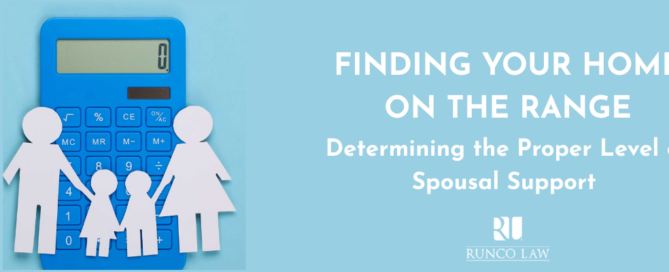Introduction
A little while back, I wrote a blog on the issue of spousal support, and discussed the issues of entitlement, quantum, and duration. I did touch upon the issue of establishing how much support should be paid (i.e., quantum), but I wanted to do a deeper dive on this specific topic. Over the past number of years, I have seen both lawyers and parties default to the mid-range of the Spousal Support Advisory Guidelines (herein, the SSAGs), which can be generated with the help of family law software programs, such as DivorceMate. I think some lawyers, and self-represented clients, do themselves a disservice, and do not effectively argue why their case should fit in the low range or the high range, as the case may be.
This blog will focus on the establishment of the ranges, and the criteria that judges, lawyers and parties should turn their mind to help them decide whether the case should fit in the low range, the mid-range, or the high range. It is important to be prepared to go into a case (whether at the beginning of the case, at a conference, on a motion, or at trial) armed with this information and the SSAG calculations. Too many times, I have seen lawyers/parties argue their case without having the necessary information (the SSAGs and the criteria) at the fingertips to present to the court when called upon to do so. You don’t want to leave money on the table, or overpay, just because you have not done your homework.
The SSAGs and the RUG
Whenever the issue of spousal support comes up, I am surprised to learn that some lawyers and self-represented parties do not understand that they have an obligation to read/know not only the SSAGs, but the Revised User Guide (herein, the RUG) to the SSAGs. These are easily found with a simple “google search” or you can go to the Canadian Department of Justice website on this issue.
With respect to the SSAGs, they were formulated and rolled out in 2008 or so to help parties, mediators, arbitrators, lawyers, and judges determine what the proper level of spousal support should be, and the duration of any award or agreement for same. Unlike child support, which makes use of Child Support Guidelines (provincial and federal) that are required to be followed, the SSAGs, by their very name, are advisory and not mandatory. However, over the passage of almost 17 years, the courts will generally rely on the figures set out in the SSAGs, unless there is a good reason why they should not. If you want to make that argument, you better have solid case law to support this position, or you will likely have your opponent, or the judge, grill you mercilessly on why the SSAGs should not apply.
With respect to the RUG, as its introductory note sets out, it’s not intended to provide a comprehensive survey of the law of spousal support; rather, it’s intended to provide practical assistance in the application and use of the SSAGs. This includes:
- Flagging common errors to avoid
- Offering suggestions for more effective use
- Noting useful suggestions and recent trends
- Identifying
- Emerging issues
It is beyond the scope of this blog to go through the entire RUG, but I wanted to identify a few important points that people need to focus on when referring to the RUG.
Common Mistakes with the SSAGs
After 17 years of jurisprudence using the SSAGs, there have been some recurring themes, and often, some bad ones. The RUG sets them out as follows:
- Garbage Going In = Garbage Coming Out – if you have used incorrect information for calculating support, or you made incorrect assumptions, you will likely get incorrect recommendations, ranges, or other information is quite unhelpful.
- Only Use the SSAGs Once Entitlement Has Been Established – don’t both generating the figures if you’re not prepared to concede that there is an entitlement to spousal support. If entitlement is not conceded, please have your argument ready to justify same.
- Use Correct Income – make sure you are using mutually accepted income levels for both parties, such as line 150 or line 236 item per the ITR or NOA, or a mutually agreed upon imputed income. If you are not in agreement, create multiple scenarios based on different numbers.
- Is Social Assistance Income for Spousal Support Purposes? – no, it should not be treated as such especially for support recipients.
- Is Any Part of the Party’s Income Non-Taxable? – sometimes, a payor or recipient will have non-taxable income, e.g., WSIB payments, or cash payments made “under the table.” Take that into consideration and, where applicable, you will need to gross up the non-taxable amount.
- Which Formula Applies? With or Without Child Support – this issues should be self-explanatory, but please make sure you include child support if it is applicable.
- Has There Been Any Cohabitation? – it is not just the length of marriage that determines duration, but rather, you must include when the parties started living together before marriage that will impact the duration.
- Are There Section 7 Expenses In Play? – if you forget to include this in your inputs, the payor will end up paying too much spousal support
- Who Is Paying/Receiving the Child Support? Just because a payor is paying spousal support does not always mean they are also paying child support. Sometimes, the spousal support recipient is also the child support payor. If so, make sure this is accurately reflected in any calculation.
- Find Your Exact Home in the Range, not Just the Range Itself – much like giving someone your street address, it is not terribly helpful without the accompanying street number. Be confident on where in the range the support figure should be, and why it should land there (I will discuss this more in a moment).
- Don’t Forget Duration – Once you establish the number, people still need to know how long support will be paid for. The SSAGs will generate a recommendation on duration. i.e. definite (time-limited) vs indefinite (not time-limited). And remember, indefinite does not necessarily mean forever. (That’s an entirely different argument).
- What About a Lump Sum Payment? Understand whether there is any merit to pay a lump sum of support, and if you do, remember that lump sum awards are not taxable (and need to be discounted accordingly for the tax implication), whereas periodic spousal support payments are taxable (and the tax is implication is included).
- Any Exceptions to the SSAG Ranges – as I mentioned above, the SSAGS are not automatically binding, and the SSAGs/RUG makes reference to some exceptions. Once again, I will discuss this later in this blog.
Avoiding the Mushy Middle
As I stated above, too often I see people default to the middle and in doing so, they either underpay spousal support or overpay spousal support. The SSAGs and RUG discuss common factors (but not an exhaustive list) to help parties to establish the proper level of spousal support within the range:
- strength of any compensatory claim – the greater the compensatory claim, the higher the range (cf. the weaker the compensatory claim, the lower the range)
- recipient’s needs – the greater the need, the higher the range (cf. the weaker the need, the lower the range)
- age of children (if any) – the older the children, the higher the range (cf. the younger the children, the lower the range) – why? once child support is over, more money for spousal support)
- number of children (if any) – the fewer the children, the higher the range (cf. the more children, the lower the range) – why? once child support is over, more money for spousal support)
- needs of the children (if any) – the lesser the needs of the children, the higher the range (cf. the greater the needs of the children, the lower the range) – why? once child support is over, more money for spousal support)
- the standard of living of children (if any)– the lesser the SOL of the children, the higher the range (cf. the greater the SOL of the children, the lower the range) – why? once child support is over, more money for spousal support)
- the needs of payor – the lesser the needs of the payor, the higher the range (cf. the greater the needs of the payor, the lower the range)
- the ability to pay of payor – the greater the ability of the payor to pay, the higher the range (cf. the lesser the ability of the payor to pay, the lower the range)
- work incentives for payor – the lesser the payor’s pay is affected by work incentives (bonuses, OT, etc.), the higher the range (cf. the greater the payor’s pay is affected by work incentives (bonuses, OT, etc.), the lesser the range)
- property division and debts – the smaller the property settlement for the recipient, the higher the range (cf. the higher the property settlement for the recipient, the lower the range)
- self-sufficiency incentives – the greater effort needed to make a recipient self-sufficient, the higher the range (cf. the more self-sufficient the recipient already is, the lower the range)
- the costs of access – the lesser the cost the payor incurs to exercise PT, the higher the range (cf. the higher the cost the payor incurs to exercise PT, the lower the range)
- high medical costs of the recipient – the higher the costs, the higher the range (cf. the lower the costs, the lower the range)
- recoupling/remarriage of the recipient – if the recipient stays single or uncoupled, the higher the range (cf. if the recipient recouples or remarries, the lower the range)
- recoupling/remarriage/second family of the payor – if the recipient stays single or uncoupled, or and does not have any more children, the higher the range (cf. if the payor recouples or remarries, and has a second family, the lower the range)
Conclusion
After a read of this blog, you can see that establishing the proper range is more an art than an exact science. Some factors are considered more important, and it is truly a case-by-case exercise. That’s why it’s so important to know the facts of your case inside and out when presented with this issue – if you go in unprepared, you may walk away with less money than you should have received, or agreed to pay more support than you ought to have paid. And if you’re a lawyer representing a client on a full retainer, on a limited scoped retainer, or as duty counsel, make sure you know your case – inside and out – to avoid any allegations of dropping the ball in the wrong range.
Remember, every case is unique, just like you are. If you are facing real legal problems, you need the right legal solutions. Please contact Runco Law at 289-799-3080 or email me at carm@runcolaw.ca.

